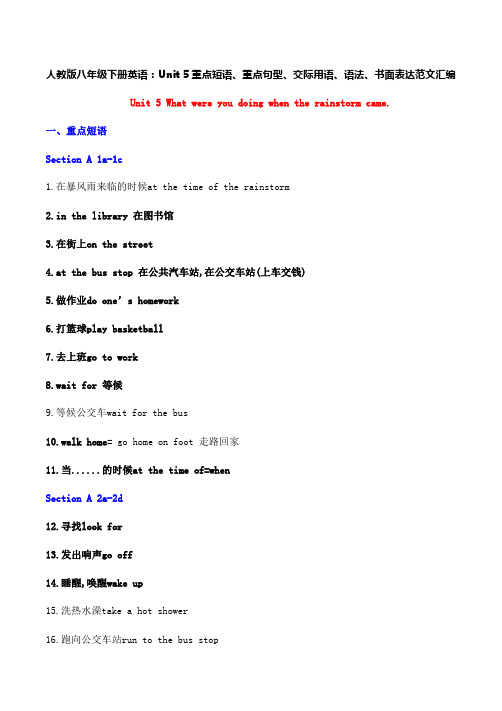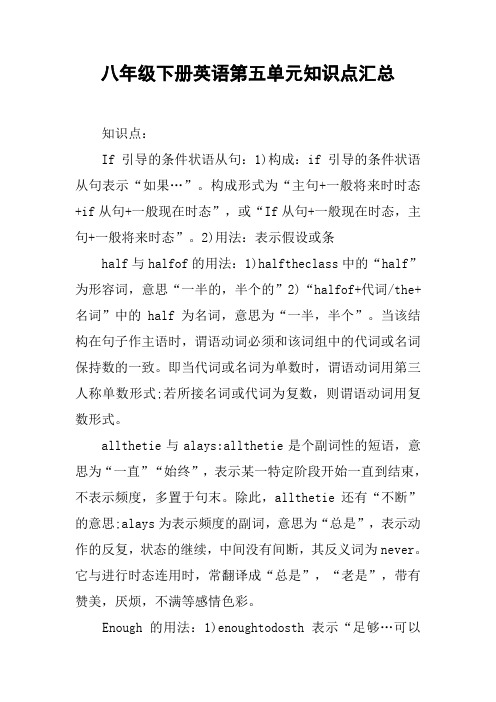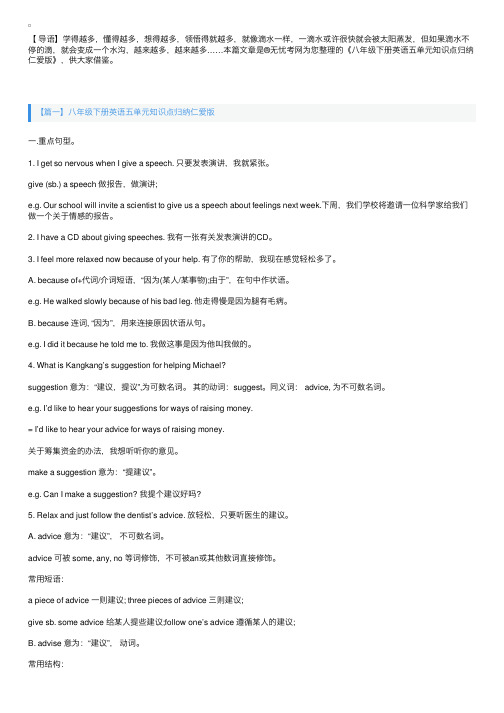八年级下册英语第五单元知识点汇总范文整理
人教版八年级下册英语复习 Unit 5 重要短语、句型、重点讲解及作文范文

人教版八年级下册英语 Unit 1重要短语、句型、重点讲解及作文范文Unit 5 What were you doing when the rainstorm came?一、重点短语1. make sure 确信;确认2. beat against... 拍打… …3. fall asleep 进人梦乡;睡着4. die down 逐渐变弱;逐渐消失5. wake up 醒来6. in a mess 一团糟7. break.. . apart 使……分离8. in times of difficulty 在困难的时候9. at the time of 当.......时候10. go off (闹钟)发出响声11. take a hot shower 洗热水澡12. miss the bus 错过公交车13. pick up 接电话14. bring... together 使……靠拢15. in the area 在这个地区16. miss the event 错过这个事件17. by the side of the road 在路边18. the Animal Helpline 动物保护热线19. walk by 走路经过20. make one’s way to. •. 在某人去……的路上21. hear the news 听到这个消息22. important events in history历史上的重大事件23.for example 例如24.be killed 被杀害25.over 50 5 0多(岁)26. a school pupil 一个小学生27. on the radio 通过广播28.in silence 沉默;无声29. more recently 最近地;新近30.the World Trade Center 世贸中心31.take down 拆除;摧毁32.have meaning to 对……有意义33.remember doing sth. 记得做过某事34. at first 首先;最初第1页共6页二、重点句型1. — What were you doing at eight last night? — I was taking a shower. 我在洗淋浴。
八年级英语下册Unit5 What were you doing when the rainstorm came知识点整理

八年级英语下册Unit5 What were you doing when the rainstormcame知识点整理八年级英语下册Unit5 What were you doing when the rainstorm came?知识点整理一.基础知识讲解. What were people doing yesterday at the time of the rainstorm?昨天当暴风雨来临的时候人们正在做些什么?【解析1】过去进行时过去进行时态⑴ .用法:①过去某个时间正在发生的动作 He was cooking at six last night. 昨天晚上六点,他正在做饭。
②过去某段时间正在发生的动作 I was staying here from March to May last year.去年从3月到5月,我一直呆在这里。
⑵ .与过去进行时连用的时间状语,常见的有 at nine last night/ at that time= then/at this time yesterday / 或有when the teacher came in/ while he was reading的提示⑶ 过去进行时的构成:was\were +现在分词⑷ 过去进行时的四个基本句型肯定句He was cooking at six last night. 否定句 He was not cooking at six last night. 一般疑问句 Was he cooking at six last night? 两回答Yes ,he was. No, he wasn’t. 特殊疑问句 What was he doing at six last night? ⑸ 过去进行时的固定句型 Jim was reading when the teacher came in. 当老师进来的时候,吉姆正在读书。
人教版八年级下册英语:Unit 5重点短语、重点句型、交际用语、语法、书面表达范文汇编(全面!)

人教版八年级下册英语:Unit 5重点短语、重点句型、交际用语、语法、书面表达范文汇编Unit 5 What were you doing when the rainstorm came.一、重点短语Section A 1a-1c1.在暴风雨来临的时候at the time of the rainstorm2.in the library 在图书馆3.在街上on the street4.at the bus stop 在公共汽车站,在公交车站(上车交钱)5.做作业do one’s homework6.打篮球play basketball7.去上班go to work8.wait for 等候9.等候公交车wait for the bus10.walk home= go home on foot 走路回家11.当......的时候at the time of=whenSection A 2a-2d12.寻找look for13.发出响声go off14.睡醒,唤醒wake up15.洗热水澡take a hot shower16.跑向公交车站run to the bus stop17.错过了公交车miss the bus18.昨天早上yesterday morning19.昨天晚上last night20.pick up(pick up the phone)=answer the phone接电话21.in the kitchen在厨房22.take/have a shower 洗澡23.at that time在那时24.so many +复数名词,这/那么多25.那么多次so many timesSection A 3a-3c26.外面狂风大作strong winds outside27.black clouds 乌云28.with no light outside=without light outside外面没有光29.feel like好像,感觉30.就像午夜/半夜feel like midnight31.一场猛烈的暴风雨a heavy rainstorm32.in the area 在这个地区(区域)33.in the neighborhood 在附近(街区/住宿区/小区/社区)34.pieces of wood 木片/块35.make sure 确保;查明;确信;确认;保证36.put ...on the table 把..放在桌子上37.做晚饭make dinner38.beat against... 拍打,敲打……39.after dinner 晚饭后40.玩纸牌游戏play a card game41.玩得开心have fun with...42.at first =first of all=at the beginning首先43.finally =at last=in the end最后44.fall asleep睡着/进入梦乡45.go to bed/\go to sleep 去睡觉46.逐渐减弱/消失die down47.(声音、光线等)渐弱/渐无die away48.消失,灭绝die out49.死于die of/from50.go outside with sb. 和某人出去51.in a mess 一团糟,乱七八糟,乱糟糟的,一片混乱52.fallen trees 倒下的树53.破碎的窗玻璃,损坏的窗户broken windows54.everywhere=here and there到处55.clean up打扫干净,清扫56.break (many things) apart把(许多东西)弄得支离破碎,破坏了许多东西57.把......破坏/折断/分开break...apart58.bring sb. closer together把......的距离/关系拉近;使……靠拢/更亲密了59.bring families and neighbors closer together让家人和邻居们的关系更紧密了60.in times of difficulty 在困难的时候/期Section A Grammar Focus-4c61.昨天晚上八点钟at eight last night62.下大雨/暴雨rain heavily/hard63.帮助某人做某事help sb. with64.拍照take photos65.买饮料buy a drink66.弹钢琴play the piano67.离开家,离开房子leave the house68.打开收音机turn on the radio69.打开turn on70.关闭turn off71.take the car to the car wash开车到洗车场72.听收音机listen to the radio73.广播新闻radio news74.谈论talk about75.一起车祸a car accident76.出去go out77.立刻,马上right away=at once=right now=in a minute78.看,看一看have a look=look at79.到达事故现场get to the place of the accident80.到达 get to=reach=arrive in(大地点)/at(小地点)81.严重变形in a bad shape82.hitting a tree由于撞到树上83.因为,由于because of84.前一天晚上下大雪the heavy snow from the before night85.上个星期天早上 last Sunday morning86.那你呢?What/How about you?87.你在开玩笑吧,你简直是在开玩笑。
八年级下册英语第五单元知识点汇总【DOC范文整理】

八年级下册英语第五单元知识点汇总知识点:If引导的条件状语从句:1)构成:if引导的条件状语从句表示“如果…”。
构成形式为“主句+一般将来时时态+if从句+一般现在时态”,或“If从句+一般现在时态,主句+一般将来时态”。
2)用法:表示假设或条half与halfof的用法:1)halftheclass中的“half”为形容词,意思“一半的,半个的”2)“halfof+代词/the+名词”中的half为名词,意思为“一半,半个”。
当该结构在句子作主语时,谓语动词必须和该词组中的代词或名词保持数的一致。
即当代词或名词为单数时,谓语动词用第三人称单数形式;若所接名词或代词为复数,则谓语动词用复数形式。
allthetie与alays:allthetie是个副词性的短语,意思为“一直”“始终”,表示某一特定阶段开始一直到结束,不表示频度,多置于句末。
除此,allthetie还有“不断”的意思;alays为表示频度的副词,意思为“总是”,表示动作的反复,状态的继续,中间没有间断,其反义词为never。
它与进行时态连用时,常翻译成“总是”,“老是”,带有赞美,厌烦,不满等感情色彩。
Enough的用法:1)enoughtodosth表示“足够…可以做…”2)enough也可以用“for+宾语+todosth的结构”3)enough修饰名词时前面不用冠词4)当主语是代词时,enough可以作表语。
当主语是名词时,enough不能做表语。
choose的用法:1)choose+名词意思为“选择…”;2)choose+beteen/fro从…中选择;3)choosetodo选择做某事Exercise的用法:1)运动,锻炼,是不可数名词2)体操,练习,是可数名词。
3)动词,使….运动ear,puton,haveon,dress:ear“穿着”“戴着”,表示状态,是延续性动词,一般现在时表示经常状态,现在进行时表示暂时状态;puton“穿上”“戴上”,表示动作,是非延续性动词;haveon“穿着”“戴着”,表示状态可以与ear 互换;dress“穿上”“穿着”,既表示状态,也表示动作,既可以作及物动词,也可以作不及物动词。
XX八年级下册英语第五单元重点单词短语汇总(人教版)【DOC范文整理】

XX八年级下册英语第五单元重点单词短语汇总(人教版)XX八年级下册英语第五单元重点单词短语汇总rainstor[ˈreɪnstɔ:]n.暴风雨alar[əˈlɑ:]n.闹钟gooff发出响声begin[bɪˈgɪn]v.开始heavily[ˈhevɪli]adv.在很大程度上,大量地suddenly[ˈsʌdənli]adv.突然地picup接电话strange[streɪndʒ]ad奇怪的,陌生的,奇特的stor[stɔ:]n.暴风雨ind[aɪnd]n.风light[laɪt]n.&v.电灯;点燃report[riˈpɔ:t]v.报导,报告area['eərɪə]n.范围,地域,地区ood[ʊd]n.树木,木材,树木indo[ˈindəu]n.窗户flashlight['flæʃlaɪt]n.手电筒,火炬atch[ætʃ]n.火柴,比赛beat[bi:t]v.敲打,打败against[əˈgenst]prep.反对,对…不利asleep[əˈsli:p]ad睡着的,熟睡的fallasleep进入梦乡,睡着diedon逐渐变弱,逐渐消失rise[raɪz]v.上升,升起fallen[ˈfɔ:lən]ad倒下的,落下的apart[əˈpɑ:t]adv.分离,分开havealoo看一看icy[ˈaɪsɪ]ad覆盖着冰的,冰冷的id[ɪd]n.&v.小孩;开玩笑,欺骗realize[ˈri:əlaɪz]v.认识到,了解aeone'say前往,费力地前进passage[ˈpæsɪdʒ]n.章节,段落pupil[ˈpju:pl]n.学生pletely[əˈpli:tli]adv.彻底地,完全地shoced[ʃɔt]ad震惊的,震撼的silence[ˈsaɪləns]n.寂静,沉默insilence沉默,无声recently[ˈri:sntli]adv.不久前,近来,最近taedon拆除,往下拽,记录terrorist[ˈterərɪst]n.恐怖分子date[deɪt]n.日期,日子toer[ˈtaʊə]n.塔atfirst首先,最初truth[tru:θ]n.真相,真理,事实【重点短语】in/onthestreet在街上aesure确信;确认atthebusstop在公共汽车站beatagainst...拍打……atthetieoftherainstor在下暴雨的时候fallasleep/ill进人梦乡/生病diedon逐渐变弱;逐渐消失dieout灭绝dieaay消失dieof/fro…死于……aeup醒findtheneighborhoodinaess发现周转一团糟joinsoebodytodosoething和某人一起做……brea...apart使……分离intiesofdifficult面对困难的时候atthetieof当.......时候atthattie在那时0.gooff发出响声1.taeahotshoer洗热水澡issthebus错过公交车3.picup接电话stronginds狂风heavyrain/sno大雨/雪darclouds乌云bring...together使……靠拢taethecartothecarash把车开到洗车场beinthearea在这个地区aedinner做晚餐fallintrouble遇到麻烦fallinloveithsb.爱上某人isstheevent错过这个事theplaceoftheaccident事故发生地gettothebusstop到达汽车站bythesideoftheroad在路边theAnialHelpline动物保护热线alby走路经过0.aeone’saytosoehere=onone’saytosoehere在某人去……的路上;前进behelpfultodosth做…有帮助1.hearthenes听到这个消息thenesofiportanteventsinhistory历史上的重要事件的新闻thenesontheradio/TV收音机/电视的新闻2.bepletelyshoced被彻底震惊therestof…其余的…;剩下的…cheersoebodyon给某人加油/打气3.forexaple例如beilled被杀害over50=orethan50多aschoolpupil一个小学生ontheradio通过广播insilence沉默;无声insurprise吃惊地injoy高兴地orerecently最近地;新近0.theorldTradecenter世贸中心taedon拆除;摧毁betaendonbyterrorists被恐怖分子摧毁looouttheindo看窗外haveeaningtosb.对某人有意义havetrouble/difficulty/probledoingsoething=thereist rouble/difficulty/probledoingsoething做……有麻烦/困难/问题3.pointout指出thebigday一个重要的日子adayateSithillneverforget凯特Sith永远不会忘记的一天3.reeberdoingsth.记得做过某事playedthesongithoutanyistaes毫不出错地演奏了这首歌callouttheinner大声喊出胜者atfirst首先;最初thehappiestdayofylife我生命中最高兴的一天sofar到目前为止getitet打湿becaughtintherain被阻于雨中becaughtunderabigstone被压于大石下allofsudden突然leavesb/sths把某人/某物留在某地bebusydoingsth.=bebusyithsth忙于某事runbachoe跑回家。
八年级下册仁爱版英语第五单元常考作文

探索科技世界:八年级下册仁爱版英语第五单元作文In the fast-paced world of technology, we areconstantly surrounded by new inventions and advancementsthat shape our lives. As students in Grade 8, we areexcited to explore the wonders of science and technology, and the fifth unit of the Ren'ai English textbook for this grade level provides us with a platform to delve into this fascinating world.The unit begins with a fascinating lesson on thehistory of technology, taking us through the journey fromthe early days of fire and tools to the modern-day wondersof the internet and artificial intelligence. This lessonnot only gives us a sense of the remarkable progress madeby mankind but also inspires us to dream of a better future. Following this, the unit delves into various aspects of technology, such as its impact on our daily lives, the ethical implications of new technologies, and the role of technology in society. Through engaging activities and discussions, we learn to appreciate the conveniencesbrought by technology while also being aware of itspotential downsides.One of the most exciting parts of the unit is theproject where we are asked to design our own technological invention. This project not only allows us to be creative and imaginative but also helps us understand the complexity and challenges involved in technology development. From concept to design, we learn to think critically and creatively, applying our knowledge of science andtechnology to create something new and useful.In conclusion, the fifth unit of the Ren'ai English textbook for Grade 8 provides us with a comprehensive understanding of the world of technology. Through engaging lessons and activities, we are able to explore the wondersof science and technology, dream of a better future, and contribute to the development of technology in our ownsmall way.**探索科技世界:八年级下册仁爱版英语第五单元作文** 在科技飞速发展的世界里,我们总是被新的发明和进步所包围,它们塑造着我们的生活。
八年级下册英语unit5范文

八年级下册英语unit5范文全文共3篇示例,供读者参考篇1Unit 5 in the eighth grade English textbook is focused on the theme of "Life in the future". In this unit, students learn about various aspects of the future, such as technology, job opportunities, education, and environmental issues. Through reading, listening, speaking, and writing activities, students are encouraged to think about what the future might look like and how they can prepare for it.The unit begins with a reading passage that introduces students to some of the advancements in technology that are predicted to shape the future, such as artificial intelligence, virtual reality, and renewable energy. Students are then guided through discussions on how these advancements might impact their lives and the world around them. They are also asked to consider the ethical implications of these technologies and how they can be used for the benefit of society.In the listening activities, students listen to interviews with professionals in various fields to learn about the jobopportunities that may be available in the future. They also listen to discussions about the importance of education in preparing for the future and the skills that will be needed to succeed in a rapidly changing world.The speaking activities in this unit focus on discussing predictions for the future and expressing opinions on different topics related to life in the future. Students are encouraged to use vocabulary and grammar structures related to the future, such as future tenses, modal verbs of possibility, and conditionals.Finally, in the writing activities, students are asked to write essays or reports on different aspects of life in the future. They may be asked to research a specific topic, such as the impact of climate change on the future, and present their findings in a well-organized and persuasive manner.Overall, Unit 5 provides students with a comprehensive understanding of the possibilities and challenges that lie ahead in the future. By engaging with these topics through various language activities, students develop their language skills while also broadening their perspectives on the world around them.篇2Unit 5 in the eighth grade English textbook covers a variety of topics, including education, future plans, and dreams. In this unit, students will learn how to talk about their future goals, discuss their career aspirations, and express their hopes and ambitions. They will also practice using the simple future tense to talk about future events and plans.One of the key themes in Unit 5 is the importance of education in achieving one's goals and dreams. Students will explore the role of education in opening up opportunities and shaping their futures. They will learn about different career paths and the skills and qualifications needed to pursue them. Through various reading passages, dialogues, and exercises, students will also reflect on their own educational experiences and consider how they can work towards their desired futures.Another focus of Unit 5 is on setting goals and making plans for the future. Students will learn how to talk about their ambitions and aspirations, as well as the steps they need to take to achieve them. They will practice using future time expressions, such as "will," "going to," and "shall," to discuss their short-term and long-term plans. Through group discussions androle-playing activities, students will also develop theircommunication skills and learn how to express their ideas and opinions confidently.In addition, Unit 5 encourages students to think about their dreams and vision for the future. They will be inspired to set high goals for themselves and pursue their passions with dedication and perseverance. Through writing tasks and creative projects, students will have the opportunity to articulate their dreams and explore the possibilities that lie ahead.Overall, Unit 5 provides students with the necessary tools and language skills to talk about their future plans and dreams in English. By engaging with the material in this unit, students will be able to reflect on their own ambitions and aspirations, set realistic goals for themselves, and take steps towards achieving their dreams. Through practice and application, students will develop their language proficiency and become more confident communicators in expressing their future goals and plans.篇3Unit 5 in our 8th-grade English textbook is all about travel. In this unit, we learned about different types of transportation, common phrases and expressions used while traveling, and howto describe our dream vacation. Here, I will be sharing with you a travel essay based on what we have learned in Unit 5.Title: My Dream VacationI have always dreamed of going on a trip to Japan. The Land of the Rising Sun has always fascinated me with its rich culture, breathtaking landscapes, and delicious cuisine. My dream vacation in Japan would be a mix of exploring the bustling city of Tokyo and discovering the serene beauty of Kyoto.The first stop on my dream vacation would be Tokyo, the vibrant capital city of Japan. I would visit iconic landmarks such as the Tokyo Tower, Shibuya Crossing, and Senso-ji Temple. I would also indulge in the delicious street food that Tokyo is famous for, like sushi, ramen, and takoyaki. Exploring the quirky Harajuku district and shopping for souvenirs at the bustling Tsukiji Fish Market would also be on my itinerary.After experiencing the hustle and bustle of Tokyo, I would head to Kyoto, the ancient capital of Japan. In Kyoto, I would immerse myself in the traditional Japanese culture by visiting historical temples such as Kinkaku-ji (Golden Pavilion) and Fushimi Inari Shrine. I would also explore the picturesque Arashiyama Bamboo Grove and experience a traditional tea ceremony in a serene tea house.Throughout my dream vacation, I would travel by the efficient and convenient Japanese transportation system, including bullet trains (Shinkansen), subways, and buses. I would also practice using common travel phrases such as "Excuse me, where is the nearest train station?" and "Can I have a ticket to Kyoto, please?"In conclusion, my dream vacation in Japan would be an unforgettable experience filled with cultural discoveries, culinary delights, and breathtaking sights. I hope that one day I will have the opportunity to turn this dream into reality and explore the Land of the Rising Sun for myself.。
八年级下册英语五单元知识点归纳仁爱版

【导语】学得越多,懂得越多,想得越多,领悟得就越多,就像滴⽔⼀样,⼀滴⽔或许很快就会被太阳蒸发,但如果滴⽔不停的滴,就会变成⼀个⽔沟,越来越多,越来越多……本篇⽂章是®⽆忧考⽹为您整理的《⼋年级下册英语五单元知识点归纳仁爱版》,供⼤家借鉴。
【篇⼀】⼋年级下册英语五单元知识点归纳仁爱版⼀.重点句型。
1. I get so nervous when I give a speech. 只要发表演讲,我就紧张。
give (sb.) a speech 做报告,做演讲;e.g. Our school will invite a scientist to give us a speech about feelings next week.下周,我们学校将邀请⼀位科学家给我们做⼀个关于情感的报告。
2. I have a CD about giving speeches. 我有⼀张有关发表演讲的CD。
3. I feel more relaxed now because of your help. 有了你的帮助,我现在感觉轻松多了。
A. because of+代词/介词短语,“因为(某⼈/某事物);由于”,在句中作状语。
e.g. He walked slowly because of his bad leg. 他⾛得慢是因为腿有⽑病。
B. because 连词, “因为”,⽤来连接原因状语从句。
e.g. I did it because he told me to. 我做这事是因为他叫我做的。
4. What is Kangkang’s suggestion for helping Michael?suggestion 意为:“建议,提议”,为可数名词。
其的动词:suggest。
同义词: advice, 为不可数名词。
e.g. I’d like to hear your suggestions for ways of raising money.= I’d like to hear your advice for ways of raising money.关于筹集资⾦的办法,我想听听你的意见。
- 1、下载文档前请自行甄别文档内容的完整性,平台不提供额外的编辑、内容补充、找答案等附加服务。
- 2、"仅部分预览"的文档,不可在线预览部分如存在完整性等问题,可反馈申请退款(可完整预览的文档不适用该条件!)。
- 3、如文档侵犯您的权益,请联系客服反馈,我们会尽快为您处理(人工客服工作时间:9:00-18:30)。
八年级下册英语第五单元知识点汇总
知识点:
If引导的条件状语从句:1)构成:if引导的条件状语从句表示“如果…”。
构成形式为“主句+一般将来时时态+if 从句+一般现在时态”,或“If从句+一般现在时态,主句+一般将来时态”。
2)用法:表示假设或条
half与halfof的用法:1)halftheclass中的“half”为形容词,意思“一半的,半个的”2)“halfof+代词/the+名词”中的half为名词,意思为“一半,半个”。
当该结构在句子作主语时,谓语动词必须和该词组中的代词或名词保持数的一致。
即当代词或名词为单数时,谓语动词用第三人称单数形式;若所接名词或代词为复数,则谓语动词用复数形式。
allthetie与alays:allthetie是个副词性的短语,意思为“一直”“始终”,表示某一特定阶段开始一直到结束,不表示频度,多置于句末。
除此,allthetie还有“不断”的意思;alays为表示频度的副词,意思为“总是”,表示动作的反复,状态的继续,中间没有间断,其反义词为never。
它与进行时态连用时,常翻译成“总是”,“老是”,带有赞美,厌烦,不满等感情色彩。
表示“足够…可以1)enoughtodosth的用法:Enough 做…”2)enough也可以用“for+宾语+todosth的结构”
3)enough修饰名词时前面不用冠词4)当主语是代词时,enough可以作表语。
当主语是名词时,enough不能做表语。
choose的用法:1)choose+名词意思为“选
择…”;2)choose+beteen/fro从…中选择;3)choosetodo选择做某事
Exercise的用法:1)运动,锻炼,是不可数名词2)体操,练习,是可数名词。
3)动词,使….运动
ear,puton,haveon,dress:ear“穿着”“戴着”,表示状态,是延续性动词,一般现在时表示经常状态,现在进行时表示暂时状态;puton“穿上”“戴上”,表示动作,是非延续性动词;haveon“穿着”“戴着”,表示状态可以与ear互换;dress “穿上”“穿着”,既表示状态,也表示动作,既可以作及物动词,也可以作不及物动词。
Dress作及物动词,表示“给自己或别人穿”,宾语是人,常用被动语态。
dressoneself 给。
穿衣服。
dressup化装
alot,alotof与lotsof三者都有“许多,很多”的意思。
alotof,lotsof一般用于肯定句,后接可数名词复数或不可数名词;alot作名词时=alotofthins,作副词,修饰动词或形容词,副词比较级。
基础达标
仔细阅读对话,选择恰当的答语。
.Ⅰ
IfIseehiagain,I________hihatyousaid.
hat_________iftheydon'tagreeitheachother?
Ifyougiveetie,I________thesolution.
hatillhesayifheever________thetruth?
Ifthetrain________ontie,itillbehereinteninutes.
Ⅱ.连接句子。
…getaspeedingticet.
…havetoleavetheroo.
…looliearocstar.
…feelsorry.
…passtheexaination.
Ifyourdaddrivestoofast,he'll…
Ifyoudon'tetothepartytoday,you'll…
henyoustudyhard,youcan…
Ifyoucheguinclass,you'll…
henyoudyeyourhairgreen,you…
Ⅲ.用括号内所给动词的正确时态填空。
I'afraidI____________ acoldtoorro.
There____________ afiltoorroorning.
Loo!Thechildren____________ intheriver.
---hattie____________ she____________
hoeeveryday?
---At8o'cloc.
ehearhe____________ nextonth.
能力提升
Ⅰ.单项选择
I_______tobeduntilygrannycaebachoe.
A.didn't
B.ent
c.hadgone
D.havegone
I'llletyounoassoonashe__________bac.
A.es
B.ille
c.ising
D.e
eillhaveasportseetingifit_________raintoorro.
A.on't
B.isn't
c.don't
D.doesn't
youaresuretopasstheexa________youstudyhard.
A.if
B.though
c.that
D.because
Bettydidn'tgotoseethefilyesterday_________sheasill.
A.because
B.but
c.until
D.if
ybrotherisyoungerthanI.Butheisnotsotall________I.
A.to
B.than
c.as
D.that
Liingdidn'tnoanythingaboutit_______Itoldhi.
A.after
B.until
c.if
D.because
Theoldanas______ea______hecouldn'tgetonthetrain.
A.so,that
B.very,that
c.too,as
D.too,to
Heisrich,______heisn'thappy.
A.or
B.so
c.and
D.but
0.eon'tgototheGreatallifit___________thedayaftertoo rro.
train ' A.on
B.israining
c.rains
train 'D.doesn。
